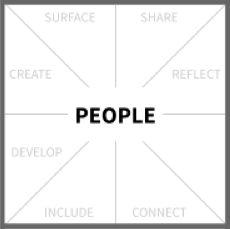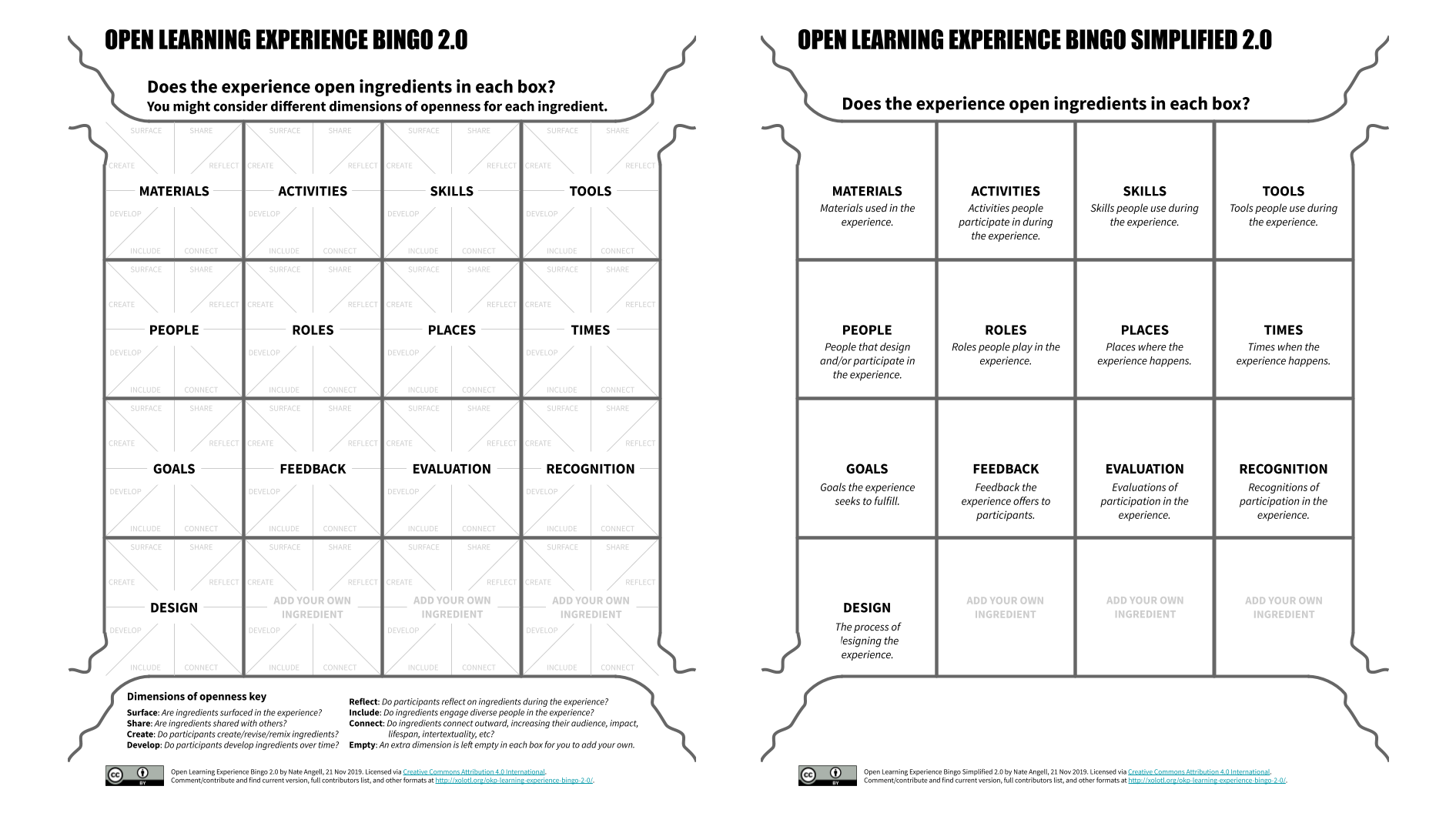This bingo card (image , Google Slides ) is designed to offer a way for people to consider how learning experiences — like activities, assignments, modules, or courses — might be “opened” in various ways. For example, a learning experience might be opened by enabling wider access to more people, more agency for people involved, or more possibilities in its materials, tools, goals, outcomes, and/or design.
We offer it as a bingo card in hopes that you can use it to explore the openness of learning experiences — and perhaps generate ideas about how to open them further — rather than merely to judge how open they are like a rubric might. As I wrote before : “While the rubric was maybe attempting to answer a question like: ‘How open is this learning experience?’ I’m hoping this bingo card and its future augmentations can help people answer a fundamentally different question: ‘What dimensions of openness does this learning experience incorporate and generate?’”
The full bingo card includes boxes containing possible “ingredients” in a learning experience, and radiating from the center of each box, “dimensions” of openness along which an ingredient might be opened. There are open spaces for people to add other learning experience ingredients and/or dimensions of openness. Borders of the card are also left open in various places to suggest that the bingo card itself could be opened more.
A close-up of the “People” ingredient box from the bingo card, showing dimensions of openness radiating out from its center. Please comment and contribute! Highlight any text on this page to add Hypothesis annotations, add comments or webmentions below, and/or contact me . I’m including all those who contribute in the acknowledgements (unless they prefer to remain unacknowledged).
You can access a Google Slides version of the full bingo card that can be downloaded in various other formats, including a PDF suitable for printing, and copied so you can make your own, revised versions.
This 2.0 version grew out of collaboration around two earlier works, the OKP Learning Experience Bingo Card 1.0 (OKPLEB 1.0 ) and the OKP Learning Experience Rubric 1.1 (OKPLER 1.1 ). Below you will find a list of its contributors so far and a dynamic collaborative bibliography of resources related to it.
Learning experience ingredients
Boxes on the bingo card represent the ingredients of learning experiences: materials, activities, skills, tools, people, roles, places, times, goals, feedback, evaluation, recognition, and design. The simple version of the bingo card is just these ingredient boxes, where you consider the openness of a learning experience in relation to each box with the answer to a simple question: Does this experience open this box of ingredients?
Materials Activities Skills Tools
People Roles Places Times
Goals Feedback Evaluation Recognition
Design Open Open Open
OKP Learning Experience Bingo Simplified 2.0
Dimensions of openness
Beyond the basic question of whether any particular box IS being “opened” in a learning experience, there’s the question of HOW it’s being opened.
The pie slices radiating out from each ingredient box represent these dimensions of openness. The dimensions radiate from the center to avoid the idea of hierarchy. An ingredient might be expanding along one dimension and not another (eg, a skill in a learning experience might be developed but not reflected upon), but the bingo card does not seek to measure whether one dimension of openness is better or more important than another. Add your own dimensions of openness starting with the pie slice left open here.
The dimensions in the boxes are abbreviated, so here’s a 2.0 draft of a key. I’ve also presented some examples, but I’m not entirely sure every dimension works in every ingredient box, so I welcome new ingredients, dimensions, and examples:
Surface : Are ingredients surfaced in the experience (which I see as a prerequisite for their opening)? For example:Are the roles people play in the experience clearly articulated? Share : Are ingredients shared with others? (Note: I’m not building in any judgement here about how ingredients are shared (eg, with open licenses) as I believe the nuances of sharing are complex, depend on context, and sharing in any way can be an opening). For example:Are the materials or tools used and/or created in the experience made public? Are the materials or tools used and/or created in the experience openly licensed? Create : Do participants create/revise/remix ingredients? For example:Do participants change the places where the experience happens? Do participants create/remix/revise materials in the experience? Are participants involved in creating the processes used to evaluate their work? Develop : Do participants develop ingredients over time? For example:Do participants modify/extend activities in the experience? Reflect : Do participants reflect on ingredients during the experience? (Note: This is a meta-cognitive dimension. Special thanks to Rajiv Jhangiani for augmenting this dimension.) For example:Does the experience enable participants to think about the roles they play in it? Do participants reflect on the goals of the experience, how they engaged in them, and/or how the goals might be different/better for themselves or others? Include : Do ingredients engage diverse people in the experience? (Special thanks to Maha Bali and Remi Kalir for helping me think through this dimension.) For example:Are marginalized people engaged purposefully as a part of the experience? Do materials provide space for perspectives they do not already represent? Does the timing of the experience enable participation by people in other timezones? Connect : Do ingredients connect outward, increasing their audience, impact, lifespan, intertextuality, etc? (Special thanks to Rajiv Jhangiani for pointing to the work of Seraphin et al to help augment this dimension.) For example:Do the materials created by participants have value for a wider audience outside the context of the experience? Might activities disseminated by the participants fruitfully engage other people for some time outside the context of the experience itself? Do the goals of the experience connect to participants’ other activities/goals beyond the experience? Open : An extra pie slice is left open in each box for you to add your own dimensions of openness.Contributors: OKP Learning Experience Bingo 2.0
Bibliography: Open Learning Experience Design
Resources listed below are items in the larger, public Open Knowledge Practices Zotero group bibliography that appear in the subcollection, Learning Experience Bingo .
Let me know if you have a resource to add to this bibliography or send me your email address if you would like to join the collaborative Zotero group to add and tag resources yourself.
1561563
okp,ler,leb
items
0
author
asc
1656
https://xolotl.org/wp-content/plugins/zotpress/
%7B%22status%22%3A%22success%22%2C%22updateneeded%22%3Afalse%2C%22instance%22%3A%22zotpress-a0c2af34adf7e9117b999f48d87593a9%22%2C%22meta%22%3A%7B%22request_last%22%3A0%2C%22request_next%22%3A0%2C%22used_cache%22%3Atrue%7D%2C%22data%22%3A%5B%7B%22key%22%3A%22QPVXMHTW%22%2C%22library%22%3A%7B%22id%22%3A1561563%7D%2C%22meta%22%3A%7B%22creatorSummary%22%3A%22Bali%22%2C%22parsedDate%22%3A%222017-04-21%22%2C%22numChildren%22%3A0%7D%2C%22bib%22%3A%22%3Cdiv%20class%3D%5C%22csl-bib-body%5C%22%20style%3D%5C%22line-height%3A%202%3B%20padding-left%3A%201em%3B%20text-indent%3A-1em%3B%5C%22%3E%5Cn%20%20%3Cdiv%20class%3D%5C%22csl-entry%5C%22%3EBali%2C%20Maha.%20%26%23x201C%3BCuration%20of%20Posts%20on%20Open%20Pedagogy%20%23YearOfOpen.%26%23x201D%3B%20%3Ci%3EReflecting%20Allowed%3C%5C%2Fi%3E%2C%2021%20Apr.%202017%2C%20%3Ca%20href%3D%27https%3A%5C%2F%5C%2Fblog.mahabali.me%5C%2Fwhyopen%5C%2Fcuration-of-posts-on-open-pedagogy-yearofopen%5C%2F%27%3Ehttps%3A%5C%2F%5C%2Fblog.mahabali.me%5C%2Fwhyopen%5C%2Fcuration-of-posts-on-open-pedagogy-yearofopen%5C%2F%3C%5C%2Fa%3E.%3C%5C%2Fdiv%3E%5Cn%3C%5C%2Fdiv%3E%22%2C%22data%22%3A%7B%22itemType%22%3A%22blogPost%22%2C%22title%22%3A%22Curation%20of%20Posts%20on%20Open%20Pedagogy%20%23YearOfOpen%22%2C%22creators%22%3A%5B%7B%22creatorType%22%3A%22author%22%2C%22firstName%22%3A%22Maha%22%2C%22lastName%22%3A%22Bali%22%7D%5D%2C%22abstractNote%22%3A%22In%20preparation%20for%20Monday%5Cu2019s%20Open%20Pedagogy%20Hangout%20%28see%20announcement%20here%5Cu00a0%5Cu2013%20includes%20list%20of%20guests%20and%20YouTube%20watch%20link%29%20I%5Cu00a0thought%20it%20might%20be%20useful%20to%20roughly%20curate%20some%20%5Cu2026%22%2C%22blogTitle%22%3A%22Reflecting%20Allowed%22%2C%22date%22%3A%222017-04-21T10%3A37%3A17%2B00%3A00%22%2C%22url%22%3A%22https%3A%5C%2F%5C%2Fblog.mahabali.me%5C%2Fwhyopen%5C%2Fcuration-of-posts-on-open-pedagogy-yearofopen%5C%2F%22%2C%22language%22%3A%22en%22%2C%22collections%22%3A%5B%22QJKN5G4N%22%5D%2C%22dateModified%22%3A%222019-12-01T20%3A29%3A47Z%22%7D%7D%2C%7B%22key%22%3A%22XTGKCIBZ%22%2C%22library%22%3A%7B%22id%22%3A1561563%7D%2C%22meta%22%3A%7B%22creatorSummary%22%3A%22Bali%22%2C%22parsedDate%22%3A%222017-04-20%22%2C%22numChildren%22%3A1%7D%2C%22bib%22%3A%22%3Cdiv%20class%3D%5C%22csl-bib-body%5C%22%20style%3D%5C%22line-height%3A%202%3B%20padding-left%3A%201em%3B%20text-indent%3A-1em%3B%5C%22%3E%5Cn%20%20%3Cdiv%20class%3D%5C%22csl-entry%5C%22%3EBali%2C%20Maha.%20%26%23x201C%3BWhat%20Is%20Open%20Pedagogy%3F%20%23YearOfOpen%20Hangout%20April%2024.%26%23x201D%3B%20%3Ci%3EReflecting%20Allowed%3C%5C%2Fi%3E%2C%2020%20Apr.%202017%2C%20%3Ca%20href%3D%27https%3A%5C%2F%5C%2Fblog.mahabali.me%5C%2Fwhyopen%5C%2Fwhat-is-open-pedagogy-yearofopen-hangout-april-24%5C%2F%27%3Ehttps%3A%5C%2F%5C%2Fblog.mahabali.me%5C%2Fwhyopen%5C%2Fwhat-is-open-pedagogy-yearofopen-hangout-april-24%5C%2F%3C%5C%2Fa%3E.%3C%5C%2Fdiv%3E%5Cn%3C%5C%2Fdiv%3E%22%2C%22data%22%3A%7B%22itemType%22%3A%22blogPost%22%2C%22title%22%3A%22What%20is%20Open%20Pedagogy%3F%20%23YearOfOpen%20hangout%20April%2024%22%2C%22creators%22%3A%5B%7B%22creatorType%22%3A%22author%22%2C%22firstName%22%3A%22Maha%22%2C%22lastName%22%3A%22Bali%22%7D%5D%2C%22abstractNote%22%3A%22What%20is%20Open%20Pedagogy%3F%20Who%20gets%20to%20define%20what%20open%20pedagogy%20is%2C%20and%20how%20does%20that%20affect%20all%20of%20us%20who%20call%20what%20we%20practice%20%5Cu201copen%20pedagogy%5Cu201d%3F%20I%20was%20invited%20to%20submit%20my%20answer%20to%20that%20question%20by%20the%20OEConsortium%20for%20%23YearOfOpen%20a%20while%20ago%2C%20and%20I%20submitted%20it%20before%20my%20trip%20to%20London%20to%20OER17.%20During%20%23OER17%2C%20my%20response%2C%20as%20well%20as%20others%5Cu2019%2C%20was%20published%20here.%20My%20feeling%20was%20that%3A%20A%20discussion%20among%20open%20pedagogy%20advocates%20and%20practitioners%20was%20needed%20beyond%20these%20statements.%20More%20diversity%20of%20voices%20on%20the%20matter%20are%20needed.%20David%20Wiley%5Cu2019s%20contribution%20is%20controversial%20imho%20and%20I%20wanted%20an%20opportunity%20to%20discuss%20a%20variety%20of%20approaches.%20Hence%20the%20hangout%20I%20am%20announcing%20here.%20I%20have%20lots%20of%20complicated%20feelings%20about%20this%20topic%2C%20and%20I%20have%20invited%20a%20bunch%20of%20%28relatively%29%20diverse%20folks%20to%20discuss%20this%20topic%20as%20part%20of%20%23YearOfOpen.%22%2C%22blogTitle%22%3A%22Reflecting%20Allowed%22%2C%22date%22%3A%222017-04-20T08%3A29%3A37%2B00%3A00%22%2C%22url%22%3A%22https%3A%5C%2F%5C%2Fblog.mahabali.me%5C%2Fwhyopen%5C%2Fwhat-is-open-pedagogy-yearofopen-hangout-april-24%5C%2F%22%2C%22language%22%3A%22en%22%2C%22collections%22%3A%5B%22QJKN5G4N%22%5D%2C%22dateModified%22%3A%222019-12-02T19%3A08%3A40Z%22%7D%7D%2C%7B%22key%22%3A%225C8T5LST%22%2C%22library%22%3A%7B%22id%22%3A1561563%7D%2C%22meta%22%3A%7B%22creatorSummary%22%3A%22Baroud%20et%20al.%22%2C%22numChildren%22%3A1%7D%2C%22bib%22%3A%22%3Cdiv%20class%3D%5C%22csl-bib-body%5C%22%20style%3D%5C%22line-height%3A%202%3B%20padding-left%3A%201em%3B%20text-indent%3A-1em%3B%5C%22%3E%5Cn%20%20%3Cdiv%20class%3D%5C%22csl-entry%5C%22%3EBaroud%2C%20Fawzi%2C%20et%20al.%20%26%23x201C%3BWhat%20Is%20Open%20Education%3F%26%23x201D%3B%20%3Ci%3EYear%20of%20Open%3C%5C%2Fi%3E%2C%20%3Ca%20href%3D%27https%3A%5C%2F%5C%2Fwww.yearofopen.org%5C%2Fwhat-is-open-education%5C%2F%27%3Ehttps%3A%5C%2F%5C%2Fwww.yearofopen.org%5C%2Fwhat-is-open-education%5C%2F%3C%5C%2Fa%3E.%20Accessed%202%20Dec.%202019.%3C%5C%2Fdiv%3E%5Cn%3C%5C%2Fdiv%3E%22%2C%22data%22%3A%7B%22itemType%22%3A%22blogPost%22%2C%22title%22%3A%22What%20is%20Open%20Education%3F%22%2C%22creators%22%3A%5B%7B%22creatorType%22%3A%22author%22%2C%22firstName%22%3A%22Fawzi%22%2C%22lastName%22%3A%22Baroud%22%7D%2C%7B%22creatorType%22%3A%22author%22%2C%22firstName%22%3A%22Glenda%22%2C%22lastName%22%3A%22Cox%22%7D%2C%7B%22creatorType%22%3A%22author%22%2C%22firstName%22%3A%22Allen%22%2C%22lastName%22%3A%22Rao%22%7D%2C%7B%22creatorType%22%3A%22author%22%2C%22firstName%22%3A%22Peter%22%2C%22lastName%22%3A%22Smith%22%7D%2C%7B%22creatorType%22%3A%22author%22%2C%22firstName%22%3A%22Sophie%22%2C%22lastName%22%3A%22Touze%22%7D%5D%2C%22abstractNote%22%3A%22%22%2C%22blogTitle%22%3A%22Year%20of%20Open%22%2C%22date%22%3A%22%22%2C%22url%22%3A%22https%3A%5C%2F%5C%2Fwww.yearofopen.org%5C%2Fwhat-is-open-education%5C%2F%22%2C%22language%22%3A%22en-US%22%2C%22collections%22%3A%5B%22QJKN5G4N%22%5D%2C%22dateModified%22%3A%222019-12-02T19%3A07%3A51Z%22%7D%7D%2C%7B%22key%22%3A%22A9EXMJ8G%22%2C%22library%22%3A%7B%22id%22%3A1561563%7D%2C%22meta%22%3A%7B%22creatorSummary%22%3A%22Cormier%22%2C%22parsedDate%22%3A%222019-03-24%22%2C%22numChildren%22%3A1%7D%2C%22bib%22%3A%22%3Cdiv%20class%3D%5C%22csl-bib-body%5C%22%20style%3D%5C%22line-height%3A%202%3B%20padding-left%3A%201em%3B%20text-indent%3A-1em%3B%5C%22%3E%5Cn%20%20%3Cdiv%20class%3D%5C%22csl-entry%5C%22%3ECormier%2C%20David.%20%3Ci%3EOpen%20Pedagogy%20%26%23x2013%3B%20A%20Three%20Day%20Seminar%20at%20Digital%20Pedagogy%20Lab%3C%5C%2Fi%3E.%2024%20Mar.%202019%2C%20%3Ca%20href%3D%27http%3A%5C%2F%5C%2Fdavecormier.com%5C%2Fedblog%5C%2F2019%5C%2F03%5C%2F24%5C%2Fopen-pedagogy-a-three-day-seminar-at-digital-pedagogy-lab%5C%2F%27%3Ehttp%3A%5C%2F%5C%2Fdavecormier.com%5C%2Fedblog%5C%2F2019%5C%2F03%5C%2F24%5C%2Fopen-pedagogy-a-three-day-seminar-at-digital-pedagogy-lab%5C%2F%3C%5C%2Fa%3E.%3C%5C%2Fdiv%3E%5Cn%3C%5C%2Fdiv%3E%22%2C%22data%22%3A%7B%22itemType%22%3A%22blogPost%22%2C%22title%22%3A%22Open%20Pedagogy%20%5Cu2013%20A%20three%20day%20seminar%20at%20Digital%20Pedagogy%20Lab%22%2C%22creators%22%3A%5B%7B%22creatorType%22%3A%22author%22%2C%22firstName%22%3A%22David%22%2C%22lastName%22%3A%22Cormier%22%7D%5D%2C%22abstractNote%22%3A%22%22%2C%22blogTitle%22%3A%22%22%2C%22date%22%3A%222019-03-24%22%2C%22url%22%3A%22http%3A%5C%2F%5C%2Fdavecormier.com%5C%2Fedblog%5C%2F2019%5C%2F03%5C%2F24%5C%2Fopen-pedagogy-a-three-day-seminar-at-digital-pedagogy-lab%5C%2F%22%2C%22language%22%3A%22en%22%2C%22collections%22%3A%5B%22QJKN5G4N%22%5D%2C%22dateModified%22%3A%222019-12-01T20%3A29%3A47Z%22%7D%7D%2C%7B%22key%22%3A%22QQ336HNK%22%2C%22library%22%3A%7B%22id%22%3A1561563%7D%2C%22meta%22%3A%7B%22creatorSummary%22%3A%22Cronin%22%2C%22parsedDate%22%3A%222017-08-15%22%2C%22numChildren%22%3A2%7D%2C%22bib%22%3A%22%3Cdiv%20class%3D%5C%22csl-bib-body%5C%22%20style%3D%5C%22line-height%3A%202%3B%20padding-left%3A%201em%3B%20text-indent%3A-1em%3B%5C%22%3E%5Cn%20%20%3Cdiv%20class%3D%5C%22csl-entry%5C%22%3ECronin%2C%20Catherine.%20%26%23x201C%3BOpenness%20and%20Praxis%3A%20Exploring%20the%20Use%20of%20Open%20Educational%20Practices%20in%20Higher%20Education.%26%23x201D%3B%20%3Ci%3EThe%20International%20Review%20of%20Research%20in%20Open%20and%20Distributed%20Learning%3C%5C%2Fi%3E%2C%20vol.%2018%2C%20no.%205%2C%20Aug.%202017%2C%20%3Ca%20href%3D%27http%3A%5C%2F%5C%2Fwww.irrodl.org%5C%2Findex.php%5C%2Firrodl%5C%2Farticle%5C%2Fview%5C%2F3096%27%3Ehttp%3A%5C%2F%5C%2Fwww.irrodl.org%5C%2Findex.php%5C%2Firrodl%5C%2Farticle%5C%2Fview%5C%2F3096%3C%5C%2Fa%3E.%3C%5C%2Fdiv%3E%5Cn%3C%5C%2Fdiv%3E%22%2C%22data%22%3A%7B%22itemType%22%3A%22journalArticle%22%2C%22title%22%3A%22Openness%20and%20Praxis%3A%20Exploring%20the%20Use%20of%20Open%20Educational%20Practices%20in%20Higher%20Education%22%2C%22creators%22%3A%5B%7B%22creatorType%22%3A%22author%22%2C%22firstName%22%3A%22Catherine%22%2C%22lastName%22%3A%22Cronin%22%7D%5D%2C%22abstractNote%22%3A%22%22%2C%22date%22%3A%222017%5C%2F08%5C%2F15%22%2C%22language%22%3A%22en%22%2C%22DOI%22%3A%22%22%2C%22ISSN%22%3A%221492-3831%22%2C%22url%22%3A%22http%3A%5C%2F%5C%2Fwww.irrodl.org%5C%2Findex.php%5C%2Firrodl%5C%2Farticle%5C%2Fview%5C%2F3096%22%2C%22collections%22%3A%5B%22QJKN5G4N%22%5D%2C%22dateModified%22%3A%222020-01-03T18%3A22%3A29Z%22%7D%7D%2C%7B%22key%22%3A%22M9D8E8SN%22%2C%22library%22%3A%7B%22id%22%3A1561563%7D%2C%22meta%22%3A%7B%22creatorSummary%22%3A%22DeRosa%22%2C%22parsedDate%22%3A%222017-04-24%22%2C%22numChildren%22%3A1%7D%2C%22bib%22%3A%22%3Cdiv%20class%3D%5C%22csl-bib-body%5C%22%20style%3D%5C%22line-height%3A%202%3B%20padding-left%3A%201em%3B%20text-indent%3A-1em%3B%5C%22%3E%5Cn%20%20%3Cdiv%20class%3D%5C%22csl-entry%5C%22%3EDeRosa%2C%20Robin.%20%26%23x201C%3BOpen%20Pedagogy%3A%20Quick%20Reflection%20for%20%23YearOfOpen.%26%23x201D%3B%20%3Ci%3EActualham%3C%5C%2Fi%3E%2C%2024%20Apr.%202017%2C%20%3Ca%20href%3D%27http%3A%5C%2F%5C%2Frobinderosa.net%5C%2Funcategorized%5C%2F1775%5C%2F%27%3Ehttp%3A%5C%2F%5C%2Frobinderosa.net%5C%2Funcategorized%5C%2F1775%5C%2F%3C%5C%2Fa%3E.%3C%5C%2Fdiv%3E%5Cn%3C%5C%2Fdiv%3E%22%2C%22data%22%3A%7B%22itemType%22%3A%22blogPost%22%2C%22title%22%3A%22Open%20Pedagogy%3A%20Quick%20Reflection%20for%20%23YearOfOpen%22%2C%22creators%22%3A%5B%7B%22creatorType%22%3A%22author%22%2C%22firstName%22%3A%22Robin%22%2C%22lastName%22%3A%22DeRosa%22%7D%5D%2C%22abstractNote%22%3A%22Open%20Pedagogy.%20I%5Cu2019m%20taking%20a%2015-minute%20break%20in%20a%20busy%20afternoon%20to%20sketch%20out%20some%20thoughts%20ahead%20of%20the%20%23YearOfOpen%20hangout%20happening%20in%20a%20few%20minutes.%20Access.%22%2C%22blogTitle%22%3A%22actualham%22%2C%22date%22%3A%222017-04-24T19%3A53%3A22%2B00%3A00%22%2C%22url%22%3A%22http%3A%5C%2F%5C%2Frobinderosa.net%5C%2Funcategorized%5C%2F1775%5C%2F%22%2C%22language%22%3A%22en-US%22%2C%22collections%22%3A%5B%22QJKN5G4N%22%5D%2C%22dateModified%22%3A%222019-12-02T19%3A08%3A27Z%22%7D%7D%2C%7B%22key%22%3A%223VSENUXR%22%2C%22library%22%3A%7B%22id%22%3A1561563%7D%2C%22meta%22%3A%7B%22creatorSummary%22%3A%22DeRosa%20and%20Jhangiani%22%2C%22parsedDate%22%3A%222018-03-16%22%2C%22numChildren%22%3A1%7D%2C%22bib%22%3A%22%3Cdiv%20class%3D%5C%22csl-bib-body%5C%22%20style%3D%5C%22line-height%3A%202%3B%20padding-left%3A%201em%3B%20text-indent%3A-1em%3B%5C%22%3E%5Cn%20%20%3Cdiv%20class%3D%5C%22csl-entry%5C%22%3EDeRosa%2C%20Robin%2C%20and%20Rajiv%20Jhangiani.%20%26%23x201C%3BOpen%20Pedagogy%20Notebook.%26%23x201D%3B%20%3Ci%3EOpen%20Pedagogy%20Notebook%3C%5C%2Fi%3E%2C%2016%20Mar.%202018%2C%20%3Ca%20href%3D%27http%3A%5C%2F%5C%2Fopenpedagogy.org%5C%2Fopen-pedagogy%5C%2F%27%3Ehttp%3A%5C%2F%5C%2Fopenpedagogy.org%5C%2Fopen-pedagogy%5C%2F%3C%5C%2Fa%3E.%3C%5C%2Fdiv%3E%5Cn%3C%5C%2Fdiv%3E%22%2C%22data%22%3A%7B%22itemType%22%3A%22webpage%22%2C%22title%22%3A%22Open%20Pedagogy%20Notebook%22%2C%22creators%22%3A%5B%7B%22creatorType%22%3A%22author%22%2C%22firstName%22%3A%22Robin%22%2C%22lastName%22%3A%22DeRosa%22%7D%2C%7B%22creatorType%22%3A%22author%22%2C%22firstName%22%3A%22Rajiv%22%2C%22lastName%22%3A%22Jhangiani%22%7D%5D%2C%22abstractNote%22%3A%22There%20are%20many%20ways%20to%20begin%20a%20discussion%20of%20%5Cu201cOpen%20Pedagogy.%5Cu201d%20Although%20providing%20a%20framing%20definition%20might%20be%20the%20obvious%20place%20to%20start%2C%20we%20want%20to%20resist%20that%20for%20just%20a%20moment%20to%20ask%20a%20set%20of%20related%20questions%3A%20What%20are%20your%20hopes%20for%20education%2C%20particularly%20for%20higher%20education%3F%20What%20vision%20do%20you%20work%20toward%20when%20you%20design%20your%20daily%20professional%20practices%20in%20and%20out%20of%20the%20classroom%3F%20How%20do%20you%20see%20the%20roles%20of%20the%20learner%20and%20the%20teacher%3F%20What%20challenges%20do%20your%20students%20face%20in%20their%20learning%20environments%2C%20and%20how%20does%20your%20pedagogy%20address%20them%3F%22%2C%22date%22%3A%222018-03-16T16%3A44%3A09%2B00%3A00%22%2C%22url%22%3A%22http%3A%5C%2F%5C%2Fopenpedagogy.org%5C%2Fopen-pedagogy%5C%2F%22%2C%22language%22%3A%22en%22%2C%22collections%22%3A%5B%22QJKN5G4N%22%5D%2C%22dateModified%22%3A%222019-12-01T20%3A29%3A47Z%22%7D%7D%2C%7B%22key%22%3A%22Y4Z2MLT6%22%2C%22library%22%3A%7B%22id%22%3A1561563%7D%2C%22meta%22%3A%7B%22creatorSummary%22%3A%22Hodgkinson-Williams%20and%20Trotter%22%2C%22parsedDate%22%3A%222018-11-19%22%2C%22numChildren%22%3A4%7D%2C%22bib%22%3A%22%3Cdiv%20class%3D%5C%22csl-bib-body%5C%22%20style%3D%5C%22line-height%3A%202%3B%20padding-left%3A%201em%3B%20text-indent%3A-1em%3B%5C%22%3E%5Cn%20%20%3Cdiv%20class%3D%5C%22csl-entry%5C%22%3EHodgkinson-Williams%2C%20Cheryl%20Ann%2C%20and%20Henry%20Trotter.%20%26%23x201C%3BA%20Social%20Justice%20Framework%20for%20Understanding%20Open%20Educational%20Resources%20and%20Practices%20in%20the%20Global%20South.%26%23x201D%3B%20%3Ci%3EJournal%20of%20Learning%20for%20Development%20-%20JL4D%3C%5C%2Fi%3E%2C%20vol.%205%2C%20no.%203%2C%20Nov.%202018%2C%20%3Ca%20href%3D%27http%3A%5C%2F%5C%2Fjl4d.org%5C%2Findex.php%5C%2Fejl4d%5C%2Farticle%5C%2Fview%5C%2F312%27%3Ehttp%3A%5C%2F%5C%2Fjl4d.org%5C%2Findex.php%5C%2Fejl4d%5C%2Farticle%5C%2Fview%5C%2F312%3C%5C%2Fa%3E.%3C%5C%2Fdiv%3E%5Cn%3C%5C%2Fdiv%3E%22%2C%22data%22%3A%7B%22itemType%22%3A%22journalArticle%22%2C%22title%22%3A%22A%20Social%20Justice%20Framework%20for%20Understanding%20Open%20Educational%20Resources%20and%20Practices%20in%20the%20Global%20South%22%2C%22creators%22%3A%5B%7B%22creatorType%22%3A%22author%22%2C%22firstName%22%3A%22Cheryl%20Ann%22%2C%22lastName%22%3A%22Hodgkinson-Williams%22%7D%2C%7B%22creatorType%22%3A%22author%22%2C%22firstName%22%3A%22Henry%22%2C%22lastName%22%3A%22Trotter%22%7D%5D%2C%22abstractNote%22%3A%22At%20the%20heart%20of%20the%20open%20educational%20resources%20%28OER%29%20movement%20is%20the%20intention%20to%20provide%20affordable%20access%20to%20culturally%20relevant%20education%20to%20all.%20This%20imperative%20could%20be%20described%20as%20a%20desire%20to%20provide%20education%20in%20a%20manner%20consistent%20with%20social%20justice%20which%2C%20according%20to%20Fraser%20%282005%29%2C%20is%20understood%20as%20%5Cu201cparity%20of%20participation%5Cu201d.%20Drawing%20on%20her%20concept%20of%20social%20justice%2C%20we%20suggest%20a%20slight%20modification%20of%20Fraser%5Cu2019s%20framework%20for%20critically%20analysing%20ways%20in%20which%20the%20adoption%20and%20impact%20of%20OER%20and%20their%20undergirding%20open%20educational%20practices%20%28OEP%29%20might%20be%20considered%20socially%20just.%20We%20then%20provide%20illustrative%20examples%20from%20the%20cross-regional%20Research%20on%20Open%20Educational%20Resources%20for%20Development%20%28ROER4D%29%20project%20%282014-2017%29%20to%20show%20how%20this%20framework%20can%20assist%20in%20determining%20in%20what%20ways%2C%20if%20at%20all%2C%20the%20adoption%20of%20OER%20and%20enactment%20of%20OEP%20have%20responded%20to%20economic%20inequalities%2C%20cultural%20inequities%20and%20political%20exclusions%20in%20education.%20Furthermore%2C%20we%20employ%20Fraser%5Cu2019s%20%282005%29%20concepts%20to%20identify%20whether%20these%20social%20changes%20are%20either%20%5Cu201caffirmative%5Cu201d%20%28i.e.%2C%20ameliorative%29%20or%20%5Cu201ctransformative%5Cu201d%20in%20their%20economic%2C%20cultural%20and%20political%20effects%20in%20the%20Global%20South%20education%20context.%22%2C%22date%22%3A%222018%5C%2F11%5C%2F19%22%2C%22language%22%3A%22en%22%2C%22DOI%22%3A%22%22%2C%22ISSN%22%3A%222311-1550%22%2C%22url%22%3A%22http%3A%5C%2F%5C%2Fjl4d.org%5C%2Findex.php%5C%2Fejl4d%5C%2Farticle%5C%2Fview%5C%2F312%22%2C%22collections%22%3A%5B%22QJKN5G4N%22%5D%2C%22dateModified%22%3A%222020-01-03T18%3A22%3A31Z%22%7D%7D%2C%7B%22key%22%3A%22CI4AMKQU%22%2C%22library%22%3A%7B%22id%22%3A1561563%7D%2C%22meta%22%3A%7B%22creatorSummary%22%3A%22Inamorato%20%20dos%20%20Santos%20et%20al.%22%2C%22parsedDate%22%3A%222016-07-27%22%2C%22numChildren%22%3A1%7D%2C%22bib%22%3A%22%3Cdiv%20class%3D%5C%22csl-bib-body%5C%22%20style%3D%5C%22line-height%3A%202%3B%20padding-left%3A%201em%3B%20text-indent%3A-1em%3B%5C%22%3E%5Cn%20%20%3Cdiv%20class%3D%5C%22csl-entry%5C%22%3EInamorato%26%23xA0%3B%20dos%26%23xA0%3B%20Santos%2C%20Andreia%2C%20et%20al.%20%3Ci%3EOpening%20up%20Education%3A%20A%20Support%20Framework%20for%20Higher%20Education%20Institutions%3C%5C%2Fi%3E.%20Text%2C%20Publications%20Office%20of%20the%20European%20Union%2C%2027%20July%202016%2C%20p.%2078%2C%20%3Ca%20href%3D%27https%3A%5C%2F%5C%2Fec.europa.eu%5C%2Fjrc%5C%2Fen%5C%2Fpublication%5C%2Feur-scientific-and-technical-research-reports%5C%2Fopening-education-support-framework-higher-education-institutions%27%3Ehttps%3A%5C%2F%5C%2Fec.europa.eu%5C%2Fjrc%5C%2Fen%5C%2Fpublication%5C%2Feur-scientific-and-technical-research-reports%5C%2Fopening-education-support-framework-higher-education-institutions%3C%5C%2Fa%3E.%3C%5C%2Fdiv%3E%5Cn%3C%5C%2Fdiv%3E%22%2C%22data%22%3A%7B%22itemType%22%3A%22report%22%2C%22title%22%3A%22Opening%20up%20Education%3A%20A%20Support%20Framework%20for%20Higher%20Education%20Institutions%22%2C%22creators%22%3A%5B%7B%22creatorType%22%3A%22author%22%2C%22firstName%22%3A%22Andreia%22%2C%22lastName%22%3A%22Inamorato%20%20dos%20%20Santos%22%7D%2C%7B%22creatorType%22%3A%22author%22%2C%22firstName%22%3A%22Yves%22%2C%22lastName%22%3A%22Punie%22%7D%2C%7B%22creatorType%22%3A%22author%22%2C%22firstName%22%3A%22Jonatan%22%2C%22lastName%22%3A%22Casta%5Cu00f1o-Mu%5Cu00f1oz%22%7D%5D%2C%22abstractNote%22%3A%22This%20report%20presents%20a%20support%20framework%20for%20higher%20education%20institutions%20%28HEIs%29%20to%20open%20up%20education.%20This%20framework%20proposes%20a%20wide%20definition%20of%20the%20term%20%5Cu2018open%20education%5Cu2019%2C%20which%20accommodates%20different%20uses%2C%20in%20order%20to%20promote%20transparency%20and%20a%20holistic%20approach%20to%20practice.%20It%20goes%20beyond%20OER%2C%20MOOCs%20and%20open%20access%20to%20embrace%2010%20dimensions%20of%20open%20education.%20The%20framework%20can%20be%20used%20as%20a%20tool%20by%20HEI%20staff%20to%20help%20them%20think%20through%20strategic%20decisions%3A%20pedagogical%20approaches%2C%20collaboration%20between%20individuals%20and%20institutions%2C%20recognition%20of%20non-formal%20learning%20and%20different%20ways%20of%20making%20content%20available.%20Contemporary%20open%20education%20is%20mostly%20enabled%20by%20ICTs%20and%20because%20of%20this%2C%20there%20is%20almost%20limitless%20potential%20for%20innovation%20and%20reach%2C%20which%20in%20turn%20contributes%20to%20the%20modernisation%20of%20higher%20education%20in%20Europe.%22%2C%22reportNumber%22%3A%22%22%2C%22reportType%22%3A%22Text%22%2C%22institution%22%3A%22Publications%20Office%20of%20the%20European%20Union%22%2C%22date%22%3A%222016-07-27T09%3A09%3A55%2B02%3A00%22%2C%22language%22%3A%22en%22%2C%22url%22%3A%22https%3A%5C%2F%5C%2Fec.europa.eu%5C%2Fjrc%5C%2Fen%5C%2Fpublication%5C%2Feur-scientific-and-technical-research-reports%5C%2Fopening-education-support-framework-higher-education-institutions%22%2C%22collections%22%3A%5B%22QJKN5G4N%22%5D%2C%22dateModified%22%3A%222019-12-01T20%3A29%3A47Z%22%7D%7D%2C%7B%22key%22%3A%22F3GLWE5U%22%2C%22library%22%3A%7B%22id%22%3A1561563%7D%2C%22meta%22%3A%7B%22creatorSummary%22%3A%22Lambert%22%2C%22parsedDate%22%3A%222018-11-19%22%2C%22numChildren%22%3A2%7D%2C%22bib%22%3A%22%3Cdiv%20class%3D%5C%22csl-bib-body%5C%22%20style%3D%5C%22line-height%3A%202%3B%20padding-left%3A%201em%3B%20text-indent%3A-1em%3B%5C%22%3E%5Cn%20%20%3Cdiv%20class%3D%5C%22csl-entry%5C%22%3ELambert%2C%20Sarah%20Roslyn.%20%26%23x201C%3BChanging%20Our%20%28Dis%29Course%3A%20A%20Distinctive%20Social%20Justice%20Aligned%20Definition%20of%20Open%20Education.%26%23x201D%3B%20%3Ci%3EJournal%20of%20Learning%20for%20Development%20-%20JL4D%3C%5C%2Fi%3E%2C%20vol.%205%2C%20no.%203%2C%20Nov.%202018%2C%20%3Ca%20href%3D%27https%3A%5C%2F%5C%2Fjl4d.org%5C%2Findex.php%5C%2Fejl4d%5C%2Farticle%5C%2Fview%5C%2F290%27%3Ehttps%3A%5C%2F%5C%2Fjl4d.org%5C%2Findex.php%5C%2Fejl4d%5C%2Farticle%5C%2Fview%5C%2F290%3C%5C%2Fa%3E.%3C%5C%2Fdiv%3E%5Cn%3C%5C%2Fdiv%3E%22%2C%22data%22%3A%7B%22itemType%22%3A%22journalArticle%22%2C%22title%22%3A%22Changing%20our%20%28Dis%29Course%3A%20A%20Distinctive%20Social%20Justice%20Aligned%20Definition%20of%20Open%20Education%22%2C%22creators%22%3A%5B%7B%22creatorType%22%3A%22author%22%2C%22firstName%22%3A%22Sarah%20Roslyn%22%2C%22lastName%22%3A%22Lambert%22%7D%5D%2C%22abstractNote%22%3A%22This%20paper%20investigates%20the%20degree%20to%20which%20recent%20digital%20Open%20Education%20literature%20is%20aligned%20to%20social%20justice%20principles%2C%20starting%20with%20the%20first%20UNESCO%20definition%20of%20Open%20Educational%20Resources%20%28OER%29.%20A%20critical%20analysis%20of%2019%20texts%20was%20undertaken%20to%20track%20dominant%20and%20alternative%20ideas%20shaping%20the%20development%20of%20Open%20Education%20since%202002%20as%20it%20broadened%20and%20developed%20from%20OER%20to%20Open%20Educational%20Practices%20%28OEP%29.%20The%20paper%20begins%20by%20outlining%20the%20method%20of%20texts%20selection%2C%20including%20defining%20the%20three%20principles%20of%20social%20justice%20%28redistributive%2C%20recognitive%20and%20representational%20justice%29%20used%20as%20an%20analytical%20lens.%20Next%20the%20paper%20sets%20out%20findings%20which%20show%20where%20and%20how%20the%20principles%20of%20social%20justice%20became%20lost%20within%20the%20details%20of%20texts%2C%20or%20in%20other%20digital%20agendas%20and%20technological%20determinist%20debates.%20Finally%2C%20a%20new%20social%20justice%20aligned%20definition%20for%20Open%20Education%20is%20offered.%20The%20aim%20of%20the%20new%20definition%20is%20to%20provide%20new%20language%20and%20a%20strong%20theoretical%20framework%20for%20equitable%20education%2C%20as%20well%20as%20to%20clearly%20distinguish%20the%20field%20of%20Open%20Education%20from%20mainstream%20constructivist%20eLearning.%22%2C%22date%22%3A%222018%5C%2F11%5C%2F19%22%2C%22language%22%3A%22en%22%2C%22DOI%22%3A%22%22%2C%22ISSN%22%3A%222311-1550%22%2C%22url%22%3A%22https%3A%5C%2F%5C%2Fjl4d.org%5C%2Findex.php%5C%2Fejl4d%5C%2Farticle%5C%2Fview%5C%2F290%22%2C%22collections%22%3A%5B%22QJKN5G4N%22%5D%2C%22dateModified%22%3A%222019-12-02T20%3A58%3A28Z%22%7D%7D%2C%7B%22key%22%3A%226J5AXQB6%22%2C%22library%22%3A%7B%22id%22%3A1561563%7D%2C%22meta%22%3A%7B%22creatorSummary%22%3A%22McVerry%22%2C%22parsedDate%22%3A%222019-11-01%22%2C%22numChildren%22%3A1%7D%2C%22bib%22%3A%22%3Cdiv%20class%3D%5C%22csl-bib-body%5C%22%20style%3D%5C%22line-height%3A%202%3B%20padding-left%3A%201em%3B%20text-indent%3A-1em%3B%5C%22%3E%5Cn%20%20%3Cdiv%20class%3D%5C%22csl-entry%5C%22%3EMcVerry%2C%20Greg.%20%26%23x201C%3BDraft%20Framework%20for%20Effective%20Teaching%20and%20Higher%20Ed.%26%23x201D%3B%20%3Ci%3EINTERTEXTrEVOLUTION%3C%5C%2Fi%3E%2C%201%20Nov.%202019%2C%20%3Ca%20href%3D%27https%3A%5C%2F%5C%2Fjgregorymcverry.com%5C%2Fframeworkforeffectivehighered%27%3Ehttps%3A%5C%2F%5C%2Fjgregorymcverry.com%5C%2Fframeworkforeffectivehighered%3C%5C%2Fa%3E.%3C%5C%2Fdiv%3E%5Cn%3C%5C%2Fdiv%3E%22%2C%22data%22%3A%7B%22itemType%22%3A%22webpage%22%2C%22title%22%3A%22Draft%20Framework%20for%20Effective%20Teaching%20and%20Higher%20Ed%22%2C%22creators%22%3A%5B%7B%22creatorType%22%3A%22author%22%2C%22firstName%22%3A%22Greg%22%2C%22lastName%22%3A%22McVerry%22%7D%5D%2C%22abstractNote%22%3A%22%22%2C%22date%22%3A%2211%5C%2F1%5C%2F2019%22%2C%22url%22%3A%22https%3A%5C%2F%5C%2Fjgregorymcverry.com%5C%2Fframeworkforeffectivehighered%22%2C%22language%22%3A%22%22%2C%22collections%22%3A%5B%22QJKN5G4N%22%5D%2C%22dateModified%22%3A%222019-12-01T20%3A29%3A47Z%22%7D%7D%2C%7B%22key%22%3A%22J6UXYVQT%22%2C%22library%22%3A%7B%22id%22%3A1561563%7D%2C%22meta%22%3A%7B%22creatorSummary%22%3A%22Online%20Learning%20Consortium%22%2C%22numChildren%22%3A1%7D%2C%22bib%22%3A%22%3Cdiv%20class%3D%5C%22csl-bib-body%5C%22%20style%3D%5C%22line-height%3A%202%3B%20padding-left%3A%201em%3B%20text-indent%3A-1em%3B%5C%22%3E%5Cn%20%20%3Cdiv%20class%3D%5C%22csl-entry%5C%22%3EOnline%20Learning%20Consortium.%20%26%23x201C%3BOLC%20Quality%20Scorecard%3A%20Improve%20the%20Quality%20of%20Online%20Learning%20%26amp%3B%20Teaching.%26%23x201D%3B%20%3Ci%3EOnline%20Learning%20Consortium%3C%5C%2Fi%3E%2C%20%3Ca%20href%3D%27https%3A%5C%2F%5C%2Fonlinelearningconsortium.org%5C%2Fconsult%5C%2Folc-quality-scorecard-blended-learning-programs%5C%2F%27%3Ehttps%3A%5C%2F%5C%2Fonlinelearningconsortium.org%5C%2Fconsult%5C%2Folc-quality-scorecard-blended-learning-programs%5C%2F%3C%5C%2Fa%3E.%20Accessed%2025%20Nov.%202019.%3C%5C%2Fdiv%3E%5Cn%3C%5C%2Fdiv%3E%22%2C%22data%22%3A%7B%22itemType%22%3A%22webpage%22%2C%22title%22%3A%22OLC%20Quality%20Scorecard%3A%20Improve%20the%20Quality%20of%20Online%20Learning%20%26%20Teaching%22%2C%22creators%22%3A%5B%7B%22creatorType%22%3A%22author%22%2C%22name%22%3A%22Online%20Learning%20Consortium%22%7D%5D%2C%22abstractNote%22%3A%22The%20OLC%20Quality%20Scorecard%20-%20Benchmarking%20Tools%2C%20Checklists%2C%20%26%20Rubrics%20for%20Evaluating%20the%20Quality%20and%20Effectiveness%20of%20Online%20Learning%20Programs%20%26%20Courses%22%2C%22date%22%3A%22%22%2C%22url%22%3A%22https%3A%5C%2F%5C%2Fonlinelearningconsortium.org%5C%2Fconsult%5C%2Folc-quality-scorecard-blended-learning-programs%5C%2F%22%2C%22language%22%3A%22en-US%22%2C%22collections%22%3A%5B%22QJKN5G4N%22%5D%2C%22dateModified%22%3A%222021-12-03T22%3A25%3A53Z%22%7D%7D%2C%7B%22key%22%3A%224ZK9NVGT%22%2C%22library%22%3A%7B%22id%22%3A1561563%7D%2C%22meta%22%3A%7B%22creatorSummary%22%3A%22Schuwer%20et%20al.%22%2C%22numChildren%22%3A1%7D%2C%22bib%22%3A%22%3Cdiv%20class%3D%5C%22csl-bib-body%5C%22%20style%3D%5C%22line-height%3A%202%3B%20padding-left%3A%201em%3B%20text-indent%3A-1em%3B%5C%22%3E%5Cn%20%20%3Cdiv%20class%3D%5C%22csl-entry%5C%22%3ESchuwer%2C%20Robert%2C%20et%20al.%20%26%23x201C%3BWhat%20Is%20Open%20Pedagogy%3F%26%23x201D%3B%20%3Ci%3EYear%20of%20Open%3C%5C%2Fi%3E%2C%20%3Ca%20href%3D%27https%3A%5C%2F%5C%2Fwww.yearofopen.org%5C%2Fapril-open-perspective-what-is-open-pedagogy%5C%2F%27%3Ehttps%3A%5C%2F%5C%2Fwww.yearofopen.org%5C%2Fapril-open-perspective-what-is-open-pedagogy%5C%2F%3C%5C%2Fa%3E.%20Accessed%202%20Dec.%202019.%3C%5C%2Fdiv%3E%5Cn%3C%5C%2Fdiv%3E%22%2C%22data%22%3A%7B%22itemType%22%3A%22blogPost%22%2C%22title%22%3A%22What%20is%20Open%20Pedagogy%3F%22%2C%22creators%22%3A%5B%7B%22creatorType%22%3A%22author%22%2C%22firstName%22%3A%22Robert%22%2C%22lastName%22%3A%22Schuwer%22%7D%2C%7B%22creatorType%22%3A%22author%22%2C%22firstName%22%3A%22Maha%22%2C%22lastName%22%3A%22Bali%22%7D%2C%7B%22creatorType%22%3A%22author%22%2C%22firstName%22%3A%22Arthur%20Gill%22%2C%22lastName%22%3A%22Green%22%7D%2C%7B%22creatorType%22%3A%22author%22%2C%22firstName%22%3A%22Rajiv%22%2C%22lastName%22%3A%22Jhangiani%22%7D%2C%7B%22creatorType%22%3A%22author%22%2C%22firstName%22%3A%22Heather%20M.%22%2C%22lastName%22%3A%22Ross%22%7D%2C%7B%22creatorType%22%3A%22author%22%2C%22firstName%22%3A%22Devon%22%2C%22lastName%22%3A%22Ritter%22%7D%5D%2C%22abstractNote%22%3A%22%22%2C%22blogTitle%22%3A%22Year%20of%20Open%22%2C%22date%22%3A%22%22%2C%22url%22%3A%22https%3A%5C%2F%5C%2Fwww.yearofopen.org%5C%2Fapril-open-perspective-what-is-open-pedagogy%5C%2F%22%2C%22language%22%3A%22en-US%22%2C%22collections%22%3A%5B%22QJKN5G4N%22%5D%2C%22dateModified%22%3A%222019-12-02T19%3A08%3A00Z%22%7D%7D%2C%7B%22key%22%3A%22VW3GJU2Z%22%2C%22library%22%3A%7B%22id%22%3A1561563%7D%2C%22meta%22%3A%7B%22creatorSummary%22%3A%22Wiley%22%2C%22parsedDate%22%3A%222013-10-21%22%2C%22numChildren%22%3A1%7D%2C%22bib%22%3A%22%3Cdiv%20class%3D%5C%22csl-bib-body%5C%22%20style%3D%5C%22line-height%3A%202%3B%20padding-left%3A%201em%3B%20text-indent%3A-1em%3B%5C%22%3E%5Cn%20%20%3Cdiv%20class%3D%5C%22csl-entry%5C%22%3EWiley%2C%20David.%20%26%23x201C%3BWhat%20Is%20Open%20Pedagogy%3F%26%23x201D%3B%20%3Ci%3EIterating%20toward%20Openness%3C%5C%2Fi%3E%2C%2021%20Oct.%202013%2C%20%3Ca%20href%3D%27https%3A%5C%2F%5C%2Fopencontent.org%5C%2Fblog%5C%2Farchives%5C%2F2975%27%3Ehttps%3A%5C%2F%5C%2Fopencontent.org%5C%2Fblog%5C%2Farchives%5C%2F2975%3C%5C%2Fa%3E.%3C%5C%2Fdiv%3E%5Cn%3C%5C%2Fdiv%3E%22%2C%22data%22%3A%7B%22itemType%22%3A%22webpage%22%2C%22title%22%3A%22What%20is%20Open%20Pedagogy%3F%22%2C%22creators%22%3A%5B%7B%22creatorType%22%3A%22author%22%2C%22firstName%22%3A%22David%22%2C%22lastName%22%3A%22Wiley%22%7D%5D%2C%22abstractNote%22%3A%22Hundreds%20of%20thousands%20of%20words%20have%20been%20written%20about%20open%20educational%20resources%2C%20but%20precious%20little%20has%20been%20written%20about%20how%20OER%20%5Cu2013%20or%20openness%20more%20generally%20%5Cu2013%20changes%20the%20practice%20of%20education.%20Substituting%20OER%20for%20expensive%20commercial%20resources%20definitely%20save%20money%20and%20increase%20access%20to%20core%20instructional%20materials.%20Increasing%20access%20to%20core%20instructional%20materials%20will%20necessarily%20make%20significant%20improvements%20in%20learning%20outcomes%20for%20students%20who%20otherwise%20wouldn%5Cu2019t%20have%20had%20access%20to%20the%20materials%20%28e.g.%2C%20couldn%5Cu2019t%20afford%20to%20purchase%20their%20textbooks%29.%20If%20the%20percentage%20of%20those%20students%20in%20a%20given%20population%20is%20large%20enough%2C%20their%20improvement%20in%20learning%20may%20even%20be%20detectable%20when%20comparing%20learning%20in%20the%20population%20before%20OER%20adoption%20with%20learning%20in%20the%20population%20after%20OER%20adoption.%20Saving%20significant%20amounts%20of%20money%20and%20doing%20no%20harm%20to%20learning%20outcomes%20%28or%20even%20slightly%20improving%20learning%20outcomes%29%20is%20clearly%20a%20win.%20However%2C%20there%20are%20much%20bigger%20victories%20to%20be%20won%20with%20openness.%22%2C%22date%22%3A%222013-10-21T21%3A41%3A27%2B00%3A00%22%2C%22url%22%3A%22https%3A%5C%2F%5C%2Fopencontent.org%5C%2Fblog%5C%2Farchives%5C%2F2975%22%2C%22language%22%3A%22en-US%22%2C%22collections%22%3A%5B%22QJKN5G4N%22%5D%2C%22dateModified%22%3A%222019-12-01T20%3A29%3A47Z%22%7D%7D%2C%7B%22key%22%3A%22MPPE5NLG%22%2C%22library%22%3A%7B%22id%22%3A1561563%7D%2C%22meta%22%3A%7B%22creatorSummary%22%3A%22Wiley%20and%20Hilton%22%2C%22parsedDate%22%3A%222018%22%2C%22numChildren%22%3A2%7D%2C%22bib%22%3A%22%3Cdiv%20class%3D%5C%22csl-bib-body%5C%22%20style%3D%5C%22line-height%3A%202%3B%20padding-left%3A%201em%3B%20text-indent%3A-1em%3B%5C%22%3E%5Cn%20%20%3Cdiv%20class%3D%5C%22csl-entry%5C%22%3EWiley%2C%20David%2C%20and%20John%20Hilton.%20%26%23x201C%3BView%20of%20Defining%20OER-Enabled%20Pedagogy.%26%23x201D%3B%20%3Ci%3EInternational%20Review%20of%20Research%20in%20Open%20and%20Distributed%20Learning%3C%5C%2Fi%3E%2C%20vol.%2019%2C%20no.%204%2C%202018%2C%20%3Ca%20href%3D%27http%3A%5C%2F%5C%2Fwww.irrodl.org%5C%2Findex.php%5C%2Firrodl%5C%2Farticle%5C%2Fview%5C%2F3601%5C%2F4724%27%3Ehttp%3A%5C%2F%5C%2Fwww.irrodl.org%5C%2Findex.php%5C%2Firrodl%5C%2Farticle%5C%2Fview%5C%2F3601%5C%2F4724%3C%5C%2Fa%3E.%3C%5C%2Fdiv%3E%5Cn%3C%5C%2Fdiv%3E%22%2C%22data%22%3A%7B%22itemType%22%3A%22journalArticle%22%2C%22title%22%3A%22View%20of%20Defining%20OER-Enabled%20Pedagogy%22%2C%22creators%22%3A%5B%7B%22creatorType%22%3A%22author%22%2C%22firstName%22%3A%22David%22%2C%22lastName%22%3A%22Wiley%22%7D%2C%7B%22creatorType%22%3A%22author%22%2C%22firstName%22%3A%22John%22%2C%22lastName%22%3A%22Hilton%22%7D%5D%2C%22abstractNote%22%3A%22The%20term%20%5C%22open%20pedagogy%5C%22%20has%20been%20used%20in%20a%20variety%20of%20different%20ways%20over%20the%20past%20several%20decades.%20In%20recent%20years%2C%20its%20use%20has%20also%20become%20associated%20with%20Open%20Educational%20Resources%20%28OER%29.%20The%20wide%20range%20of%20competing%20definitions%20of%20open%20pedagogy%2C%20together%20with%20its%20semantic%20overlap%20with%20another%20underspecified%20term%2C%20open%20educational%20practices%2C%20makes%20it%20difficult%20to%20conduct%20research%20on%20the%20topic%20of%20open%20pedagogy.%20In%20making%20this%20claim%20we%20do%20not%20mean%20to%20cast%20doubt%20on%20the%20potential%20effectiveness%20of%20the%20many%20pedagogical%20approaches%20labeled%20open.%20In%20this%20article%2C%20rather%20than%20attempting%20to%20argue%20for%20a%20canonical%20definition%20of%20open%20pedagogy%2C%20we%20propose%20a%20new%20term%2C%20%5C%22OER-enabled%20pedagogy%2C%5C%22%20defined%20as%20the%20set%20of%20teaching%20and%20learning%20practices%20that%20are%20only%20possible%20or%20practical%20in%20the%20context%20of%20the%205R%20permissions%20that%20are%20characteristic%20of%20OER.%20We%20propose%20criteria%20used%20to%20evaluate%20whether%20a%20form%20of%20teaching%20constitutes%20OER-enabled%20pedagogy%20and%20analyze%20several%20examples%20of%20OER-enabled%20pedagogy%20with%20these%20criteria.%22%2C%22date%22%3A%2210%5C%2F2018%22%2C%22language%22%3A%22en%22%2C%22DOI%22%3A%22%22%2C%22ISSN%22%3A%22%22%2C%22url%22%3A%22http%3A%5C%2F%5C%2Fwww.irrodl.org%5C%2Findex.php%5C%2Firrodl%5C%2Farticle%5C%2Fview%5C%2F3601%5C%2F4724%22%2C%22collections%22%3A%5B%22QJKN5G4N%22%5D%2C%22dateModified%22%3A%222019-12-01T20%3A29%3A47Z%22%7D%7D%2C%7B%22key%22%3A%22SM4BLK7P%22%2C%22library%22%3A%7B%22id%22%3A1561563%7D%2C%22meta%22%3A%7B%22numChildren%22%3A1%7D%2C%22bib%22%3A%22%3Cdiv%20class%3D%5C%22csl-bib-body%5C%22%20style%3D%5C%22line-height%3A%202%3B%20padding-left%3A%201em%3B%20text-indent%3A-1em%3B%5C%22%3E%5Cn%20%20%3Cdiv%20class%3D%5C%22csl-entry%5C%22%3E%3Ci%3EOSCQR%3C%5C%2Fi%3E.%20%3Ca%20href%3D%27https%3A%5C%2F%5C%2Foscqr.org%5C%2F%27%3Ehttps%3A%5C%2F%5C%2Foscqr.org%5C%2F%3C%5C%2Fa%3E.%20Accessed%2025%20Nov.%202019.%3C%5C%2Fdiv%3E%5Cn%3C%5C%2Fdiv%3E%22%2C%22data%22%3A%7B%22itemType%22%3A%22webpage%22%2C%22title%22%3A%22OSCQR%22%2C%22creators%22%3A%5B%5D%2C%22abstractNote%22%3A%22%22%2C%22date%22%3A%22%22%2C%22url%22%3A%22https%3A%5C%2F%5C%2Foscqr.org%5C%2F%22%2C%22language%22%3A%22%22%2C%22collections%22%3A%5B%22QJKN5G4N%22%5D%2C%22dateModified%22%3A%222019-12-01T20%3A29%3A47Z%22%7D%7D%2C%7B%22key%22%3A%22IWXHMML3%22%2C%22library%22%3A%7B%22id%22%3A1561563%7D%2C%22meta%22%3A%7B%22numChildren%22%3A1%7D%2C%22bib%22%3A%22%3Cdiv%20class%3D%5C%22csl-bib-body%5C%22%20style%3D%5C%22line-height%3A%202%3B%20padding-left%3A%201em%3B%20text-indent%3A-1em%3B%5C%22%3E%5Cn%20%20%3Cdiv%20class%3D%5C%22csl-entry%5C%22%3E%3Ci%3EQM%20Rubrics%20%26amp%3B%20Standards%20%7C%20Quality%20Matters%3C%5C%2Fi%3E.%20%3Ca%20href%3D%27https%3A%5C%2F%5C%2Fwww.qualitymatters.org%5C%2Fqa-resources%5C%2Frubric-standards%27%3Ehttps%3A%5C%2F%5C%2Fwww.qualitymatters.org%5C%2Fqa-resources%5C%2Frubric-standards%3C%5C%2Fa%3E.%20Accessed%2025%20Nov.%202019.%3C%5C%2Fdiv%3E%5Cn%3C%5C%2Fdiv%3E%22%2C%22data%22%3A%7B%22itemType%22%3A%22webpage%22%2C%22title%22%3A%22QM%20Rubrics%20%26%20Standards%20%7C%20Quality%20Matters%22%2C%22creators%22%3A%5B%5D%2C%22abstractNote%22%3A%22%22%2C%22date%22%3A%22%22%2C%22url%22%3A%22https%3A%5C%2F%5C%2Fwww.qualitymatters.org%5C%2Fqa-resources%5C%2Frubric-standards%22%2C%22language%22%3A%22%22%2C%22collections%22%3A%5B%22QJKN5G4N%22%5D%2C%22dateModified%22%3A%222019-12-01T20%3A29%3A47Z%22%7D%7D%2C%7B%22key%22%3A%228WU5QYLA%22%2C%22library%22%3A%7B%22id%22%3A1561563%7D%2C%22meta%22%3A%7B%22numChildren%22%3A1%7D%2C%22bib%22%3A%22%3Cdiv%20class%3D%5C%22csl-bib-body%5C%22%20style%3D%5C%22line-height%3A%202%3B%20padding-left%3A%201em%3B%20text-indent%3A-1em%3B%5C%22%3E%5Cn%20%20%3Cdiv%20class%3D%5C%22csl-entry%5C%22%3E%3Ci%3ECape%20Town%20Open%20Education%20Declaration%2010th%20Anniversary%3C%5C%2Fi%3E.%20%3Ca%20href%3D%27https%3A%5C%2F%5C%2Fwww.capetowndeclaration.org%5C%2Fcpt10%5C%2F%27%3Ehttps%3A%5C%2F%5C%2Fwww.capetowndeclaration.org%5C%2Fcpt10%5C%2F%3C%5C%2Fa%3E.%20Accessed%201%20Dec.%202019.%3C%5C%2Fdiv%3E%5Cn%3C%5C%2Fdiv%3E%22%2C%22data%22%3A%7B%22itemType%22%3A%22webpage%22%2C%22title%22%3A%22Cape%20Town%20Open%20Education%20Declaration%2010th%20Anniversary%22%2C%22creators%22%3A%5B%5D%2C%22abstractNote%22%3A%22The%20Cape%20Town%20Open%20Education%20Declaration%20was%20published%20on%20January%2022%2C%202008%2C%20sparking%20a%20global%20call%20to%20action%20that%20has%20grown%20into%20the%20vibrant%20open%20education%20movement%20that%20exists%20today.%20In%20honor%20of%20the%20ten%20year%20anniversary%2C%20we%20took%20a%20look%20back%20at%20the%20last%20decade%20and%20identified%20ten%20key%20directions%20to%20move%20open%20education%20forward.%20Click%20on%20the%20cards%20below%20to%20read%20more%20about%20each%20topic%2C%20or%20consider%20suggesting%20your%20own.%22%2C%22date%22%3A%22%22%2C%22url%22%3A%22https%3A%5C%2F%5C%2Fwww.capetowndeclaration.org%5C%2Fcpt10%5C%2F%22%2C%22language%22%3A%22English%22%2C%22collections%22%3A%5B%22QJKN5G4N%22%5D%2C%22dateModified%22%3A%222019-12-01T20%3A35%3A00Z%22%7D%7D%2C%7B%22key%22%3A%222QXQC3BG%22%2C%22library%22%3A%7B%22id%22%3A1561563%7D%2C%22meta%22%3A%7B%22numChildren%22%3A1%7D%2C%22bib%22%3A%22%3Cdiv%20class%3D%5C%22csl-bib-body%5C%22%20style%3D%5C%22line-height%3A%202%3B%20padding-left%3A%201em%3B%20text-indent%3A-1em%3B%5C%22%3E%5Cn%20%20%3Cdiv%20class%3D%5C%22csl-entry%5C%22%3E%3Ci%3EThe%20Cape%20Town%20Open%20Education%20Declaration%3C%5C%2Fi%3E.%20%3Ca%20href%3D%27https%3A%5C%2F%5C%2Fwww.capetowndeclaration.org%5C%2Fread-the-declaration%27%3Ehttps%3A%5C%2F%5C%2Fwww.capetowndeclaration.org%5C%2Fread-the-declaration%3C%5C%2Fa%3E.%20Accessed%201%20Dec.%202019.%3C%5C%2Fdiv%3E%5Cn%3C%5C%2Fdiv%3E%22%2C%22data%22%3A%7B%22itemType%22%3A%22webpage%22%2C%22title%22%3A%22The%20Cape%20Town%20Open%20Education%20Declaration%22%2C%22creators%22%3A%5B%5D%2C%22abstractNote%22%3A%22The%20Cape%20Town%20Open%20Education%20Declaration%20arises%20from%20a%20small%20but%20lively%20meeting%20convened%20in%20Cape%20Town%20in%20September%202007.%20The%20aim%20of%20this%20meeting%20was%20to%20accelerate%20efforts%20to%20promote%20open%20resources%2C%20technology%20and%20teaching%20practices%20in%20education.%20Convened%20by%20the%20Open%20Society%20Institute%20and%20the%20Shuttleworth%20Foundation%2C%20the%20meeting%20gathered%20participants%20with%20many%20points%20of%20view%20from%20many%20nations.%20This%20group%20discussed%20ways%20to%20broaden%20and%20deepen%20their%20open%20education%20efforts%20by%20working%20together.%20The%20first%20concrete%20outcome%20of%20this%20meeting%20is%20the%20Cape%20Town%20Open%20Education%20Declaration.%20It%20is%20at%20once%20a%20statement%20of%20principle%2C%20a%20statement%20of%20strategy%20and%20a%20statement%20of%20commitment.%20It%20is%20meant%20to%20spark%20dialogue%2C%20to%20inspire%20action%20and%20to%20help%20the%20open%20education%20movement%20grow.%22%2C%22date%22%3A%22%22%2C%22url%22%3A%22https%3A%5C%2F%5C%2Fwww.capetowndeclaration.org%5C%2Fread-the-declaration%22%2C%22language%22%3A%22English%22%2C%22collections%22%3A%5B%22QJKN5G4N%22%5D%2C%22dateModified%22%3A%222019-12-01T20%3A37%3A05Z%22%7D%7D%5D%7D
Bali, Maha. “Curation of Posts on Open Pedagogy #YearOfOpen.”
Reflecting Allowed , 21 Apr. 2017,
https://blog.mahabali.me/whyopen/curation-of-posts-on-open-pedagogy-yearofopen/ .
Bali, Maha. “What Is Open Pedagogy? #YearOfOpen Hangout April 24.”
Reflecting Allowed , 20 Apr. 2017,
https://blog.mahabali.me/whyopen/what-is-open-pedagogy-yearofopen-hangout-april-24/ .
Baroud, Fawzi, et al. “What Is Open Education?”
Year of Open ,
https://www.yearofopen.org/what-is-open-education/ . Accessed 2 Dec. 2019.
Cronin, Catherine. “Openness and Praxis: Exploring the Use of Open Educational Practices in Higher Education.”
The International Review of Research in Open and Distributed Learning , vol. 18, no. 5, Aug. 2017,
http://www.irrodl.org/index.php/irrodl/article/view/3096 .
DeRosa, Robin. “Open Pedagogy: Quick Reflection for #YearOfOpen.”
Actualham , 24 Apr. 2017,
http://robinderosa.net/uncategorized/1775/ .
DeRosa, Robin, and Rajiv Jhangiani. “Open Pedagogy Notebook.”
Open Pedagogy Notebook , 16 Mar. 2018,
http://openpedagogy.org/open-pedagogy/ .
Hodgkinson-Williams, Cheryl Ann, and Henry Trotter. “A Social Justice Framework for Understanding Open Educational Resources and Practices in the Global South.”
Journal of Learning for Development - JL4D , vol. 5, no. 3, Nov. 2018,
http://jl4d.org/index.php/ejl4d/article/view/312 .
Inamorato dos Santos, Andreia, et al.
Opening up Education: A Support Framework for Higher Education Institutions . Text, Publications Office of the European Union, 27 July 2016, p. 78,
https://ec.europa.eu/jrc/en/publication/eur-scientific-and-technical-research-reports/opening-education-support-framework-higher-education-institutions .
Lambert, Sarah Roslyn. “Changing Our (Dis)Course: A Distinctive Social Justice Aligned Definition of Open Education.”
Journal of Learning for Development - JL4D , vol. 5, no. 3, Nov. 2018,
https://jl4d.org/index.php/ejl4d/article/view/290 .
McVerry, Greg. “Draft Framework for Effective Teaching and Higher Ed.”
INTERTEXTrEVOLUTION , 1 Nov. 2019,
https://jgregorymcverry.com/frameworkforeffectivehighered .
Online Learning Consortium. “OLC Quality Scorecard: Improve the Quality of Online Learning & Teaching.”
Online Learning Consortium ,
https://onlinelearningconsortium.org/consult/olc-quality-scorecard-blended-learning-programs/ . Accessed 25 Nov. 2019.
Schuwer, Robert, et al. “What Is Open Pedagogy?”
Year of Open ,
https://www.yearofopen.org/april-open-perspective-what-is-open-pedagogy/ . Accessed 2 Dec. 2019.
Wiley, David. “What Is Open Pedagogy?”
Iterating toward Openness , 21 Oct. 2013,
https://opencontent.org/blog/archives/2975 .
Wiley, David, and John Hilton. “View of Defining OER-Enabled Pedagogy.”
International Review of Research in Open and Distributed Learning , vol. 19, no. 4, 2018,
http://www.irrodl.org/index.php/irrodl/article/view/3601/4724 .
OSCQR .
https://oscqr.org/ . Accessed 25 Nov. 2019.
QM Rubrics & Standards | Quality Matters .
https://www.qualitymatters.org/qa-resources/rubric-standards . Accessed 25 Nov. 2019.
Cape Town Open Education Declaration 10th Anniversary .
https://www.capetowndeclaration.org/cpt10/ . Accessed 1 Dec. 2019.
The Cape Town Open Education Declaration .
https://www.capetowndeclaration.org/read-the-declaration . Accessed 1 Dec. 2019.
Bibliography Contributors

